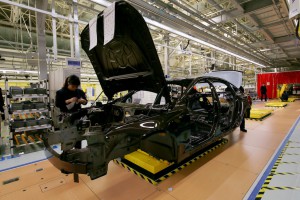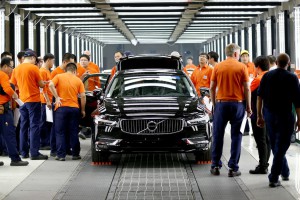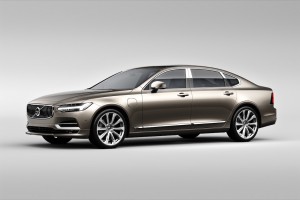
Volvo and Geely are kicking off an ambitious plan to export more Chinese-built vehicles to the U.S., starting with the S90 built at its Daqing plant.
Volvo Cars and Chinese parent Geely plan to set in motion an aggressive expansion and export plan that could be the first in a wave of new, Chinese-made vehicles earmarked for the U.S. and Europe.
Their strategy is loosely modeled after the multi-brand approach of German giant Volkswagen AG, and will see the creation of a new entry-level brand, Lynk & Co. to anchor Geely’s global ambitions. Volvo is already importing a small number of stretched S60 sedans to the U.S., and will soon add a longer version of its top-line S90. Cars built by other Geely brands are set to follow.
“We have a strong manufacturing structure in China and we are geared up for further growth,” Hakan Samuelsson, the CEO of Volvo told reporters during a Shanghai news conference.
That manufacturing base is soon to grow. Along with Volvo’s European assembly operations, the S60 Inscription model shipped to the U.S. is being built at a facility near Geely headquarters in Chengdu, capital of Szechuan province. A second Chinese plant is being set up in Daqing, about 220 miles south of Shanghai.
That factory will produce mid-range Volvo products like the 40 Series that will be based on the Swedish maker’s new Compact Modular Architecture. That platform was developed specifically to be shared with the new Lynk & Co. brand Geely unveiled in October.

Volvo is readying to begin exporting both versions of the new S90 globally from its plants in China, including to the U.S.
(Volvo teams up with Autoliv on autonomous vehicle venture. Click Here for the story.)
Going forward, Geely vehicles will be positioned at the bottom end of the company’s brand strategy, much as Volkswagen AG has done with the Skoda brand, explained long-time Chinese auto analyst Michael Dunne, of Dunne & Co. Lynk models will compete with VW-branded products, such as the familiar Golf line. And Volvo is already taking aim at the Audi line-up.
Meanwhile, the plan calls for using Volvo models like the S60 Inscription and the stretched S90 as halo cars to demonstrate that Chinese-made products now can meet world-class quality expectations, said Dunne.
Wednesday’s announcement declares that “The Chinese are coming,” added the analyst, “whether through their own brands, or through he brands they acquire.” But he also noted that, “This is not the approach the Japanese and Koreans took” when they entered the U.S. and Europe.
By starting with the upscale Volvo brand, Geely hopes that its lower-tier brands won’t have to be priced at rock-bottom levels, as was the case when Japanese marques like Toyota, Nissan and Honda first arrived in the 1950s and ’60s, and when Korea’s Hyundai and Kia followed a few decades later.
“The fact that these cars will be exclusively built in China for the global market demonstrates the quality of our Chinese factories,” said Volvo CEO Samuelsson.
(Click Here for more about Volvo tailoring its City Safety System for rural roads.)
Geely purchased Volvo from Ford in 2010 for $1.8 billion, barely a third of what the Detroit automaker had originally paid a decade earlier. But the Chinese company quickly laid out a product and manufacturing expansion program that was expected to cost at least $11 billion and now appears to be heading even higher, according to industry observers.
While a number of future Volvo products will likely be exported from China, Volvo’s strategy also calls for the company to set up a long-discussed manufacturing operation in the U.S. The $500 million factory, just outside Charleston, South Carolina, is set to go into operation in 2018 and will eventually employ as many as 4,000 hourly workers.
Volvo may have been the first automaker to ship fully assembled vehicles to the U.S. from China, but General Motors recently launched a Chinese-made model of its own, the little Buick Envision crossover-utility vehicle. As the second-largest automotive manufacturer in China, many analysts believe GM would eventually like to add other models to that list.
Meanwhile, several local Chinese brands have also been outlining U.S. export plans, notably electric carmaker BYD, but its own strategy has repeatedly been set back and there is no current date for launching American sales.
(For more on the Volvo-Uber alliance, Click Here.)
Several Chinese companies are taking a different approach, setting up their engineering and manufacturing operations in the U.S. That includes two new battery-electric vehicle firms, Faraday Future and LeEco. Both are backed by Jia Yueting, a billionaire consumer electronics entrepreneur often referred to as the Steve Jobs of China.

